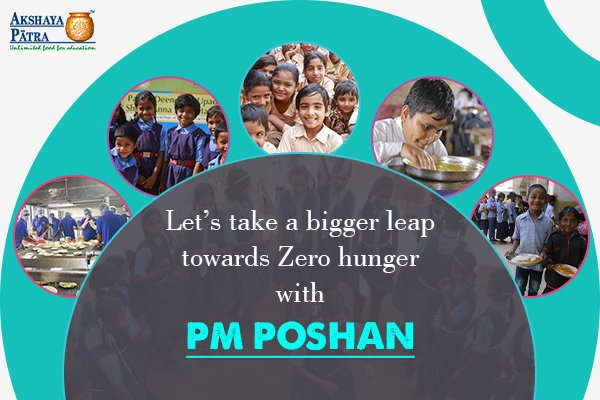
After 20 years of running the Mid-Day Meal Programme successfully, the Central government renamed it to PM Poshan and added features to enhance its effectiveness.
According to a study by the International Food Policy Research Institute (IFPRI) in the United States, India has both "the biggest number of undernourished children as well as the world's largest school feeding programme, the Mid-Day Meal (MDM) plan."
After two decades of successful implementation of the Mid-Day Meal scheme, the Union cabinet renamed it Pradhan Mantri Poshan Shakti Nirman Yojana (PM POSHAN Abhiyaan) on 29 September 2021.
But what’s the difference?
The new model focuses on monitoring a child’s nutritional levels rather than just distributing meals in schools. It will include pre-schoolers (5-6 years age group), thus adding 24 lakh children to the existing number of beneficiaries under the previous model.
About the Mid-Day Meal scheme
The Mid-Day Meal scheme has been the world’s largest school meal programme and a flagship initiative of the Indian government. It was launched in 1995 but was mandated for execution in all the states in 2001.
Under the programme, children in primary and upper-primary classes received free lunch on all working days in government and government-aided schools. It addressed malnutrition in children to attain the goal of universalisation of primary education.
This scheme had legal backing under the National Food Security Act, 2013. It further sought to:
• Improve enrolment and attendance rates in schools
• Ensure a minimum of one meal a day for the disadvantaged children
• Promote socialisation among castes
• Enhance the nutritional status of undernourished children
• Employ women at the grassroots level
About the new PM Poshan Abhiyaan
In 2021, the Mid-Day Meal Scheme underwent structural changes to expand its ambit and was renamed to PM Poshan Abhiyaan. It is launched for an initial period of five years (2021-22 to 2025-2026).
The revamped model will continue with all existing components for Class 1-8 but with additional features. This means that although freshly cooked meals will continue to reach government and government-aided schools, PM Poshan will also:
• Feed the children of pre-primary school or Bal Vatika
• Monitor the nutrition, haemoglobin levels, BMI and weight of school children for which specialists will be appointed
• Provide supplementary nutrition for anaemic children
• Train children to grow food for a “first-hand experience with nature and gardening” with nutritional gardens
• Promote women’s self-help groups (SHGs) and Farmer Producer Organizations (FPOs) by sourcing locally grown traditional food items
• Call for inspection by college and university students to ensure ground-level execution
• Encourage communities to provide food to children during festivals
The new version will benefit 11.80 crore children studying in 11.20 lakh schools across India. Like the Mid-Day Meal scheme, both the Central and State Governments will bear the cost in a 60:40 ratio.
Keeping the changes in mind, NGOs like Akshaya Patra will continue working with the Government for an efficient execution of the programme. It has been serving meals to underprivileged children for 21 years with the support of several district, state and central authorities. Its kitchens will keep up with the international standards while preparing school meals to ensure their safety and high nutritional quality, every day.
Final Thoughts
Thus, the retitled PM Poshan Abhiyaan aims to focus on holistic child nutrition owing to the success of the previous model, along with the growing needs of a fast-developing India. It seeks to promote traditional food and school nutrition gardens to improve food and financial security among the local communities of the country.
Although the scheme is backed by the Central and State Government, donations from people have always helped expand the reach of any initiative. For instance, Akshaya Patra launched three more state-of-the-art kitchens this year due to the generous support from its donors, making free food available to lakhs of additional children from hundreds of schools in just a few months.
Now you can also be a change-maker and contribute to a truly advanced India that ensures the progress of its future citizens by nourishing them every day.
Donate once with one click and feed the children from low-income families for an entire academic year.
Donate to feed the needy and watch Zero hunger becoming a reality!